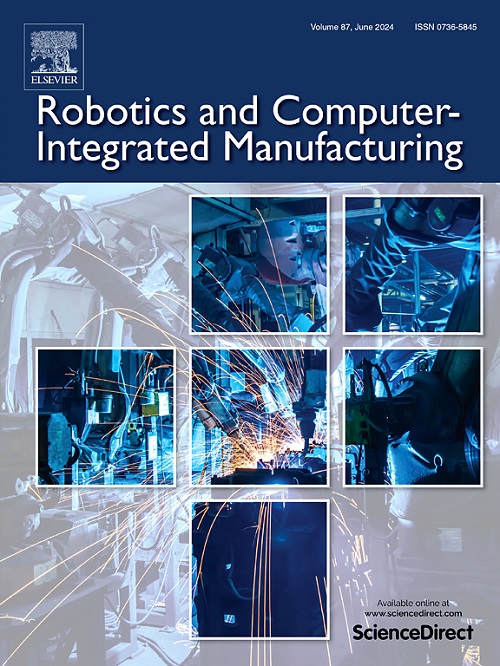基于工业机器人运行机制的能耗建模
IF 9.1
1区 计算机科学
Q1 COMPUTER SCIENCE, INTERDISCIPLINARY APPLICATIONS
引用次数: 0
摘要
工业机器人因其高效率、灵活性和对各种需求的响应能力而广泛应用于制造业。然而,工业机器人的大规模部署导致了能源消耗的显著增加。因此,开发一种准确的机器人系统能耗预测建模方法,以优化能源利用,实现制造业的绿色可持续发展至关重要。本研究在分析运动变量与工业机器人功率之间的时间因果关系以及轨迹点之间的空间依赖关系的基础上,将层归一化与双向长短期记忆神经网络相结合,提出了基于空间的力矩预测网络和基于时空的能耗预测网络。该模型在可变运动模式、时间尺度函数和负载条件下实现了机器人运动的高精度预测。基于KUKA KR210和KR60机器人的实验结果表明,该模型在不同工况下对关节扭矩、总功率和总能耗的预测精度分别达到99.01%、96.61%和98.72%。本文章由计算机程序翻译,如有差异,请以英文原文为准。
Energy consumption modeling based on operation mechanisms of industrial robots
Industrial robots are widely used in manufacturing industries due to their high efficiency, flexibility, and ability to respond to diverse needs. However, the large-scale deployment of industrial robots has resulted in a significant increase in energy consumption. Therefore, it is crucial to develop an accurate modeling method for predicting the energy consumption of robotic systems, in order to optimize energy usage and achieve green and sustainable development of the manufacturing industry. Based on the analysis of temporal causal relationships between motion variables and the power of industrial robots, as well as spatial dependence between trajectory points, this study proposes a spatial-based torque prediction network and a temporal–spatial-based energy consumption prediction network by combining layer normalization with bidirectional long short-term memory neural network. This model achieves high-precision predictions of robot motion under variable motion modes, time scaling functions, and load conditions. Experimental results with KUKA KR210 and KR60 robots demonstrate that the model achieves the prediction accuracy of 99.01% for joint torque, 96.61% for total power, and 98.72% for total energy consumption under varying conditions.
求助全文
通过发布文献求助,成功后即可免费获取论文全文。
去求助
来源期刊
CiteScore
24.10
自引率
13.50%
发文量
160
审稿时长
50 days
期刊介绍:
The journal, Robotics and Computer-Integrated Manufacturing, focuses on sharing research applications that contribute to the development of new or enhanced robotics, manufacturing technologies, and innovative manufacturing strategies that are relevant to industry. Papers that combine theory and experimental validation are preferred, while review papers on current robotics and manufacturing issues are also considered. However, papers on traditional machining processes, modeling and simulation, supply chain management, and resource optimization are generally not within the scope of the journal, as there are more appropriate journals for these topics. Similarly, papers that are overly theoretical or mathematical will be directed to other suitable journals. The journal welcomes original papers in areas such as industrial robotics, human-robot collaboration in manufacturing, cloud-based manufacturing, cyber-physical production systems, big data analytics in manufacturing, smart mechatronics, machine learning, adaptive and sustainable manufacturing, and other fields involving unique manufacturing technologies.

 求助内容:
求助内容: 应助结果提醒方式:
应助结果提醒方式:


